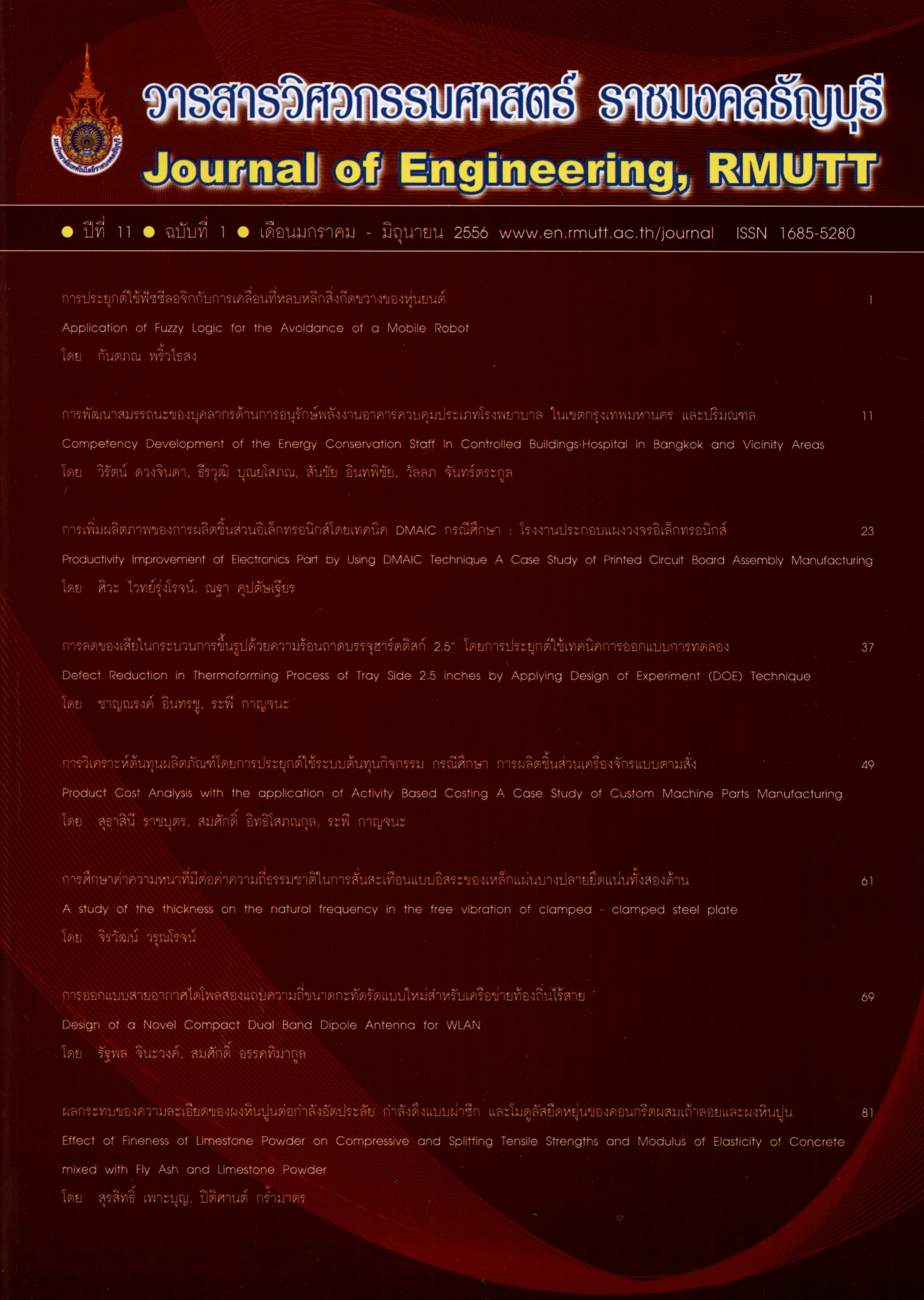Competency Development of the Energy Conservation Staff In Controlled Buildings-Hospital in Bangkok and Vicinity Areas Article Sidebar
Main Article Content
Abstract
The research on “Competency Development of the Energy Conservation Staff in Controlled Buildings-Hospital in Bangkok and Vicinity Areas” has been designed as a qualitative action research to develop competency training course and to evaluate the competency of the target group. The data in this study were derived from several groups including senior managers of the hospitals, specialists in energy conservation and responsible staff for energy conservation. Questionnaires were distributed to 95 responsible staff. The training module was tried out with 15 responsible staff for energy conservation. The research results founded that : 1) The investigation stage provided functional map consisting of 1 key purpose, 4 key roles, 10 key functions, 37 units of competences, and 103 elements of competences. Moreover, the officials in charge in energy conservation reported their needs on the skill of split type air-conditioning system maintenance. [A13] 2) The results of competency training course particularly on the maintenance of split type air conditioning system reported the improvement of 3 aspects. a) The knowledge achievement is shown by the pretest and posttest scores which were 13.87 and 18.27 respectively. b) The operational skills improved which can be seen at the rating scales of pre and post training at 2.99 and 3.33 respectively. c) The personality attribute rating scales were improved from 3.07 to 3.72 after the training. After the maintenance and cleaning of 30 split type air-conditioners the average energy consumption decreased by 7.07%. Moreover, people who received the services from the trained staff reported high satisfaction. It can be concluded that the developed training course can be practically implemented to improve the staff competencies in the controlled buildings-hospitals. So, this developed model can be applied to improve human resource competency to strengthen the business and industrial sectors.
Article Details
The manuscript, information, content, picture and so forth which were published on Frontiers in engineering innovation research has been a copyright of this journal only. There is not allow anyone or any organize to duplicate all content or some document for unethical publication.
References
พัฒนาพลังงานทดแทนและอนุรักษ์พลังาน, กรมกระทวงพลังงาน แนวทางการปฏิบัติดามพระราชบัญญัติการส่งเสริมการอนุรักษ์พลังงาน พ.ศ. 2535. กรุงเทพมหานคร : สำนักกำกับและอนุรักษ์พลังงาน, 2552.
พัฒนาพลังงานทดแทนและอนุรักษ์พลังงาน, กรมกระทรวงพลังงาน การจัดการพลังงาน[ออนไลน์] [สืบค้นวันที่ 5 ธันวาคม 2553] จาก http://www.dede.go.th.
พัฒนาพลังงานทดแทนและอนุรักษ์พลังงาน, กรมกระทรวงพลังงาน โครงการศึกษาเกณฑ์การใช้พลังงานในอุตสาหกรรมและอาคารต่าง 1 (SEC) อาการควบคุมประเภทโรงพยาบาล [ออนไลน์] [สืบค้นวันที่ 5 ชันวาคม 2553] จาก http://.www.dede.go.th.
Rylatt A. and Lohan K. Creating Training miracles. Sydney : Prentice Hall, 1995.
สุกัญญา รัศมีธรรมโชติ. แนวทางการพัฒนาศักยภาพมนุษย์ด้วย Competency based learning,กรุงเทพมหานคร : สถาบันเพิ่มผลผลิตแห่งชาติ 2549.
จะเด็ด เปาโสภา และมนตรี พรหมเพ็ชร. "การพัฒนามาตรฐานสมรรถนะ (Developing of Standards of Competence) เล่มที่ 1.กรุงเทพมหานคร: สำนักงานคณะกรรมการการอาชีวศึกษา, 2548.
อรวรรณ เมฆวิชัยและคณะ. "การพัฒนาสมรรถนะของพยาบาลโรงพยาบาลมหานครราชสีมา :การวิจัยเชิงปฏิบัติการแบบมีส่วนร่วม"วารสารคณะพยาบาลศาสตร์ มหาวิทยาลัยขอนเเก่น, 2548.
คมสัน กุศล. บทบทหน้ที่ความรู้ทักษะและเจตคติของผู้รับผิดชอบด้านพลังงาน ตามพระราชบัญญัติการส่งเสริมการอนุรักษ์พลังงาน. 2535 วิทยานิพนธ์ครุศาสตร อุตสาหกรรมมหาบัณฑิตคณะกรุศาสตร์ อุตสาหกรรม บัณฑิตวิทยาลัยสถาบันเทคโนโลยีพระจอมเกล้ำพระนครเหนือ,2544
พัฒนาพลังงานทดแทนและอนุรักษ์พลังงาน, กรมกระทรวงพลังงาน คู่มืออบรมพัฒนาบุคลากรด้านการอนุรักษ์พลังงานในอาการประเภทโรงพยาบาล. กรุงเทพมหานคร : สำนักพัฒนาทรัพยากรบุคคลค้นพลังงาน, ม.ป.ท.
McClelland, C. David. Testing for Competence rather than for Intelligence.New Jersey : American Psychologist, 1973.
Walter Diane. "Competency-based On-the-job Training for Aviation Maintenance and Inspection a human factors approach."International Journal of Industrial Ergonomics. (2000) : 249-259


